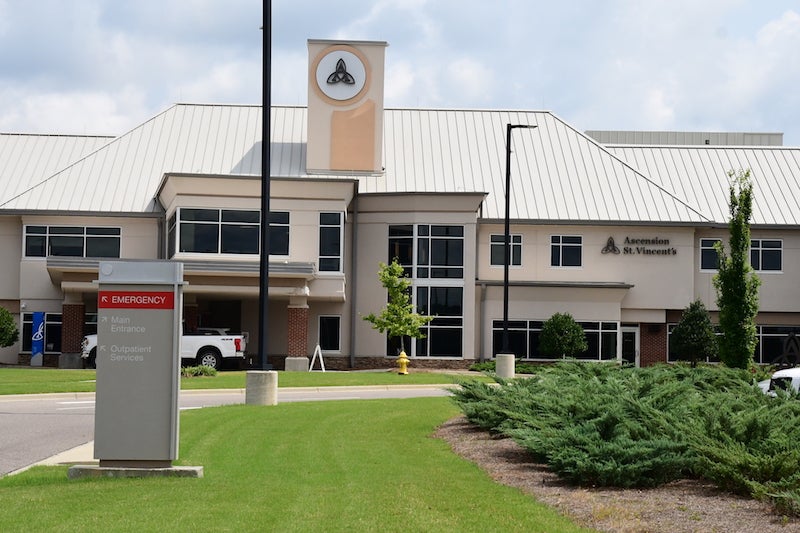St. Vincent’s Chilton helping community get good night’s sleep
Published 11:12 am Tuesday, March 14, 2023

- Ascension St. Vincent’s Chilton Hospital is bringing awareness to better sleep in the month of March in conjunction with Sleep Awareness Month. (FILE | ADVERTISER)
|
Getting your Trinity Audio player ready...
|
By Carey Reeder | Staff Writer
March is Sleep Awareness Month, and Ascension St. Vincent’s Chilton Hospital is spreading the word on how individuals can achieve better sleep and treat possible sleep disorders.
Dr. Michael Connolly, a pulmonologist at Ascension St. Vincent’s Chilton, said that proper sleep has a drastic effect on how an individual operates on a daily basis. For those who have developed sleep disorders, it is important to visit a sleep specialist to begin the process of addressing those.
“The impact sleep has on everyday life is very important for individuals, and probably underappreciated,” Connolly said. “Sleep disorders, in general, are a variety of different disorders from sleep apnea where you stop breathing, insomnia where you cannot sleep, hypersomnia or excessive sleepiness … There are a wide variety of sleep disorders that a sleep specialist will encounter.”
Sleep apnea, a condition where breathing stops and restarts many times during sleep, is one of the biggest disorders Connolly sees in his field. He said he sees obstructive sleep apnea syndrome specifically where there is a partial or complete collapse of the upper airway during sleep that can lead to sleep fragmentation and poor-quality sleep.
In the long term, this can affect an individual’s cardiovascular system and cause things like high blood pressure or an increased risk of stroke. In adults over 40 years old, 34% of males and 17% of females have sleep apnea that has gone undiagnosed or untreated.
Connolly said when a person comes in with sleep apnea, the first step is to make sure there is not an underlying medical reason for the condition. From there, the patient can be screened for sleep apnea and a referral to a sleep specialist may be made.
Aside from sleep apnea, insomnia is another disorder Connolly sees a good bit in his practice. When it comes to insomnia, sleep hygiene is the first thing Connolly looks at when trying to help an individual achieve better sleep. Things such as alcohol, nicotine and caffeine can disrupt one’s sleep and lead to insomnia. Using one’s phone or computer late at night and right before bed can contribute to insomnia as well.
“Habits play a big role, especially in the cases of insomnia,” Connolly said. “Self-medicating with caffeine or heavy over-the-counter medications is not advisable because you can trigger cardiac events, or get yourself over caffeinated.”
Connolly said it is important for people to realize how important a good night’s sleep, between seven and eight hours, and how beneficial it can be. Eight hours of sleep gives people four complete sleep cycles, which is a combination of REM and non-REM sleep. REM sleep is where the brain is working to filter out things from throughout the previous day. REM sleep increases as the night goes on and the last cycle is where the REM sleep is the longest.
Connolly said serious health issues can develop for those not getting their seven-eight hours of sleep such as trouble concentrating and a lowering of one’s immune system.
“If you short sleep, you are shortening yourself on total REM sleep. It is very important to kind of clean up the brain a little bit before you start the next day,” Connolly said. “Seven or eight hours of sleep for adults is very important because of its effects on brain function, but also your overall well-being.”
While sleeping less than seven-eight hours is not recommended, sleeping longer than eight hours also brings about health risks. Those who sleep longer than eight hours are still at risk for the same health issues as those who sleep less than seven-eight hours.
“Seven to eight hours is the right number, and too little or too much can be harmful to the individual,” Connolly said. “You can think of it like a bell-shaped curve; when you get to the seven-eight it is high, but as you get to the one to seven or eight to 12, then your complications from poor sleep go up.”
Connolly recommended the book “Why We Sleep” by Matthew Walker for those who want to learn more about how sleep affects the human body, and how to achieve better sleep for themselves.
For those who think they may be suffering from a sleep disorder, appointments can be made at the Ascension St. Vincent’s Chilton Sleep Disorder Center by calling 205-258-4459 Monday through Thursday 7a.m. to 4:30 p.m.






